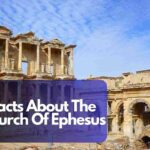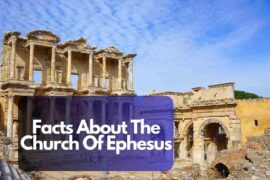The history of the Church of Ephesus is a tale that intertwines faith, devotion, and the remarkable journey of early Christianity. Founded in the first century AD, it emerged as one of the seven churches mentioned in the biblical book of Revelation, symbolizing the spiritual fervor and missionary zeal of the nascent Christian movement. Through triumphs and tribulations, the Church of Ephesus evolved, leaving an indelible mark on the pages of religious and historical chronicles.
This article aims to unravel the captivating history of the Church of Ephesus, tracing its origins, its rise to prominence, its pivotal role in the spread of Christianity, and its eventual decline. We will delve into the lives of the influential figures who shepherded the congregation, explore the architectural marvels that adorned this sacred space, and unravel the theological debates and struggles that shaped the church’s identity.
Contents
History Of The Church Of Ephesus
Ephesus was an ancient city located in the region of Anatolia, modern-day Turkey. It was one of the most prominent cities in the Roman Empire and served as a vital center of trade, commerce, and culture. Situated on the Aegean coast, Ephesus was strategically positioned for maritime trade routes, making it a prosperous and bustling city during its heyday.
Ephesus boasted remarkable architectural wonders, including the Temple of Artemis, one of the Seven Wonders of the Ancient World. The city was also renowned for its grand theater, impressive library, and well-preserved streets and buildings. Ephesus was a melting pot of cultures, attracting people from various backgrounds and beliefs.
Importance of the Church of Ephesus in Early Christianity
The Church of Ephesus held significant importance in the early Christian movement. It was one of the seven churches mentioned in the Book of Revelation in the New Testament, specifically addressed in the letter to Ephesians. The church played a vital role in the spread of Christianity in Asia Minor and had a profound influence on the development of Christian theology and doctrine.
Ephesus was visited by the Apostle Paul during his missionary journeys, and he spent a significant amount of time there, establishing and nurturing the Christian community. Paul’s teachings in Ephesus helped shape the beliefs and practices of the early Christian church, and his letter to the Ephesians is considered one of the foundational texts of Christian theology.
Furthermore, Ephesus became a center for early Christian thought and scholarship. The Church of Ephesus produced notable leaders and influential figures, such as Timothy, who served as a bishop and played a crucial role in maintaining the spiritual integrity of the community. Additionally, the apostle John, one of Jesus’ closest disciples, was believed to have spent his later years in Ephesus, further enhancing the city’s significance in early Christianity.
The Church of Ephesus faced numerous challenges and controversies, including conflicts with followers of Artemis, the rise of false teachings, and changes in political and religious climates. Despite these challenges, the Church of Ephesus left a lasting legacy. Today, the archaeological remains of Ephesus provide valuable insights into the early Christian era, and the history of the Church of Ephesus continues to be studied and appreciated for its profound impact on the development of Christianity.
Early Christianity in Ephesus
The arrival of Apostle Paul in Ephesus
The arrival of the Apostle Paul in Ephesus was a crucial event in the establishment and growth of the early Christian community. Paul first visited Ephesus during his third missionary journey around 52-54 AD. He initially encountered a small group of believers who had received only the baptism of John the Baptist. Paul imparted the teachings of Jesus Christ to them, and they were baptized in the name of Jesus.
Establishment of the Church of Ephesus
Paul’s ministry in Ephesus led to the establishment of the Church of Ephesus. The church grew rapidly, attracting both Jewish and Gentile converts. It became a thriving community of believers who gathered regularly for worship, teaching, and fellowship. The Church of Ephesus served as a spiritual center and a source of encouragement and support for Christians in the region.
Paul’s ministry and teachings in Ephesus
During his extended stay in Ephesus, Paul engaged in extensive preaching and teaching. He preached the Gospel of Jesus Christ, emphasizing salvation through faith, the redemptive work of Christ, and the indwelling of the Holy Spirit. Paul also addressed various theological and ethical issues within the church, promoting unity, love, and sound doctrine.
Paul’s teachings in Ephesus covered a wide range of topics, including the role of the Church as the body of Christ, the importance of spiritual gifts, the nature of God’s grace, and the significance of Christian virtues such as love, humility, and forgiveness. His teachings had a profound impact on the formation of Christian beliefs and practices not only in Ephesus but also in the broader early Christian movement.
The Letter to the Ephesians
Background and purpose of the letter
The Letter to the Ephesians, attributed to the Apostle Paul, was written during his imprisonment, likely in Rome, around 60-62 AD. Despite being addressed to the Church of Ephesus, the letter was intended to circulate among other churches in the region. The letter served both as a theological treatise and a pastoral exhortation, offering guidance and encouragement to the believers.
Key themes and messages in the letter
The Letter to the Ephesians explores several key themes. It highlights the concept of the Church as the body of Christ, emphasizing the unity and diversity of believers in Christ. The letter also delves into the cosmic reconciliation accomplished through Jesus Christ, with a focus on the mystery of God’s plan for salvation and the role of the Gentiles in God’s redemptive work.
Additionally, the letter addresses ethical and practical matters, urging believers to live in a manner worthy of their calling, exhibiting virtues such as love, humility, and forgiveness. It emphasizes the importance of spiritual warfare, encouraging believers to put on the armor of God to stand against the powers of darkness. The letter also provides instructions for various relationships, including marital relationships, parent-child relationships, and relationships between slaves and masters.
Significance of the letter for the Church of Ephesus
The Letter to the Ephesians held great significance for the Church of Ephesus. It reinforced the teachings of Paul, reminding the Ephesian Christians of their identity in Christ and their calling to live out their faith in a manner consistent with their beliefs. The letter provided guidance on matters of doctrine, ethics, and relationships within the church and the broader society.
Furthermore, the letter highlighted the importance of unity and diversity within the Church, encouraging the Ephesian believers to embrace their role as a spiritual community and to strive for unity amid diverse backgrounds and experiences. The Letter to the Ephesians continues to be valued as a theological and practical resource, offering profound insights into the nature of the Church and the believer’s life in Christ.
Growth and Influence of the Church
Spread of Christianity in Ephesus
The Church of Ephesus played a significant role in the spread of Christianity throughout the city and its surrounding regions. As the church grew in numbers and influence, it became a hub for evangelism and missionary activities. The teachings of Paul and other early Christian leaders resonated with many, resulting in conversions and the establishment of new Christian communities.
Role of prominent figures in the Church of Ephesus
1. Timothy and his leadership: Timothy, a close associate of the Apostle Paul, played a crucial role in the Church of Ephesus. He was entrusted with the task of shepherding and overseeing the congregation, ensuring sound doctrine, and addressing various issues within the church. Timothy’s leadership helped maintain the spiritual integrity and continuity of the church amidst challenges and changes.
2. John the Apostle’s connection to Ephesus: The apostle John, one of Jesus’ original disciples, had a significant connection to the Church of Ephesus. Tradition holds that John spent his later years in Ephesus, providing spiritual guidance and leadership to the community. His presence and influence enriched the church and contributed to the preservation of apostolic teachings and traditions.
Impact of the Church of Ephesus on neighboring regions
The Church of Ephesus exerted a substantial influence on the neighboring regions and communities. Through evangelism, missionary endeavors, and the exchange of ideas, the church became a catalyst for the spread of Christianity in Asia Minor. The teachings and examples of the Ephesian Christians inspired and influenced believers in nearby cities and towns, contributing to the growth and development of the early Christian movement.
Challenges and Controversies
Conflict with the followers of Artemis
Ephesus was known for its devotion to the ancient Greek goddess Artemis, whose magnificent temple was a prominent religious center. The Church of Ephesus faced conflict and opposition from the followers of Artemis, particularly as the influence of Christianity grew. The economic impact of the decline in the worship of Artemis caused tension and hostility toward the Christian community.
The rise of false teachings and heresies
Like many other early Christian communities, the Church of Ephesus encountered the rise of false teachings and heretical beliefs. These teachings distorted the message of Christ and posed a threat to the integrity and unity of the church. The leaders of the Church of Ephesus, including Timothy and John, actively confronted and refuted these false teachings, safeguarding the purity of Christian doctrine.
Relationship between the Church of Ephesus and other churches
The Church of Ephesus had both cooperative and challenging relationships with other early Christian communities. The Apostle Paul’s letters indicate that there were interactions and exchanges of communication between the Church of Ephesus and other churches. However, as time passed and the Christian movement diversified, theological and doctrinal differences sometimes strained relationships between Ephesus and other churches.
Despite these challenges and controversies, the Church of Ephesus left a lasting legacy in the development of early Christianity. Its growth, influence, and struggles shaped the trajectory of the faith in the region and beyond. The experiences and lessons learned by the Church of Ephesus continue to provide valuable insights for contemporary believers studying the history of Christianity.
Decline and End of the Church
Shift in the political and religious climate
The decline of the Church of Ephesus can be attributed, in part, to a shift in the political and religious climate of the region. With the fall of the Roman Empire and the rise of Byzantine rule, Christianity faced challenges from competing religious and philosophical ideologies. Additionally, the emergence of imperial decrees and policies that favored certain branches of Christianity over others led to divisions and tensions within the Church.
Influence of the Council of Chalcedon
The Council of Chalcedon, held in 451 AD, had a significant impact on the Church of Ephesus. The council dealt with theological controversies surrounding the nature of Christ, particularly the debate between the Monophysites and the Chalcedonian Christians. The Church of Ephesus, known for its Monophysite leanings, faced opposition and suppression from the Byzantine Empire, which aligned itself with the Chalcedonian position. This further marginalized the Church of Ephesus and contributed to its decline.
Transformation of Ephesus into a predominantly Muslim city
The transformation of Ephesus into a predominantly Muslim city also played a role in the decline and eventual disappearance of the Church of Ephesus. With the expansion of the Islamic Caliphate in the 7th century, the region underwent a gradual Islamization process. Christian communities, including the Church of Ephesus, faced pressures to convert to Islam or live as religious minorities. Over time, the Christian presence diminished, and Ephesus became predominantly Muslim.
Legacy and Archaeological Discoveries
Remains of the ancient city of Ephesus
The archaeological remains of Ephesus provide valuable insights into the history and significance of the Church of Ephesus. Excavations have uncovered well-preserved structures, including the impressive Library of Celsus, the Great Theater, and the ancient Roman streets. These ruins offer glimpses into the daily life and religious practices of the early Christian community.
The Significance of the Church of Mary
Within the archaeological site of Ephesus, there is a structure known as the Church of Mary, which is believed to be associated with the early Christian community. This church holds particular importance, as it is traditionally associated with the Virgin Mary and her connection to Ephesus. Many pilgrims visit the Church of Mary, considering it a sacred site.
Modern-day commemoration and understanding of the Church of Ephesus
The history and significance of the Church of Ephesus continue to be commemorated and studied in modern times. Scholars, theologians, and tourists explore the archaeological site, seeking to understand the early Christian community and its contributions. The Church of Ephesus is also remembered in Christian literature and teachings as a significant center of early Christianity, offering valuable lessons in faith, perseverance, and the challenges of living in a diverse cultural context.
Conclusion
The Church of Ephesus emerged in the ancient city of Ephesus, becoming a significant center of early Christianity. The Apostle Paul’s ministry and teachings played a crucial role in its establishment and growth. The church faced various challenges, including conflicts with followers of Artemis and the rise of false teachings. Over time, political and religious shifts, along with the transformation of Ephesus into a predominantly Muslim city, led to the decline and eventual disappearance of the Church of Ephesus.
The Church of Ephesus held great importance in early Christianity. It contributed to the spread of the Gospel in the region and beyond, nurturing a vibrant community of believers. The teachings of Paul and other prominent figures helped shape Christian theology and practice. The Church of Ephesus served as a beacon of faith, with its struggles and triumphs leaving a lasting impact on the development of Christianity.
Studying the history of the Church of Ephesus provides valuable insights into the challenges and successes faced by early Christians. It offers lessons on maintaining faith and integrity amidst cultural and religious pressures. The archaeological discoveries in Ephesus allow us to connect with the tangible remains of this influential community. Understanding the Church of Ephesus helps us appreciate the diverse and dynamic nature of early Christianity and its enduring legacy in shaping the faith we have today.









1 Comment
How can build my church because we pray in the mango tree